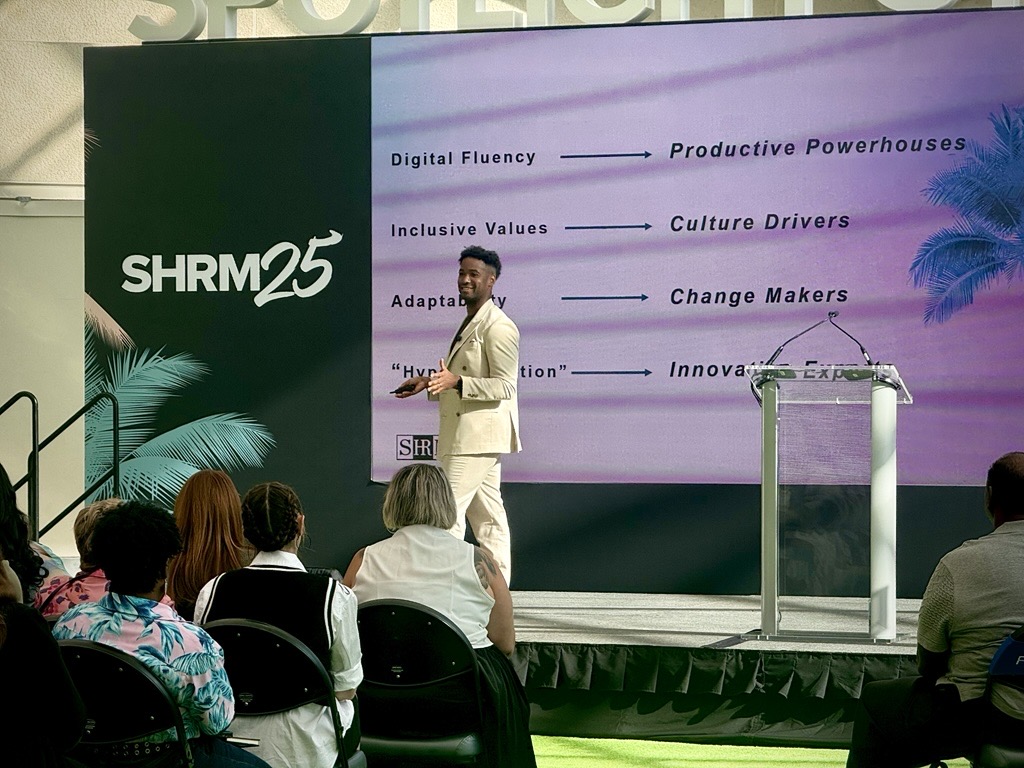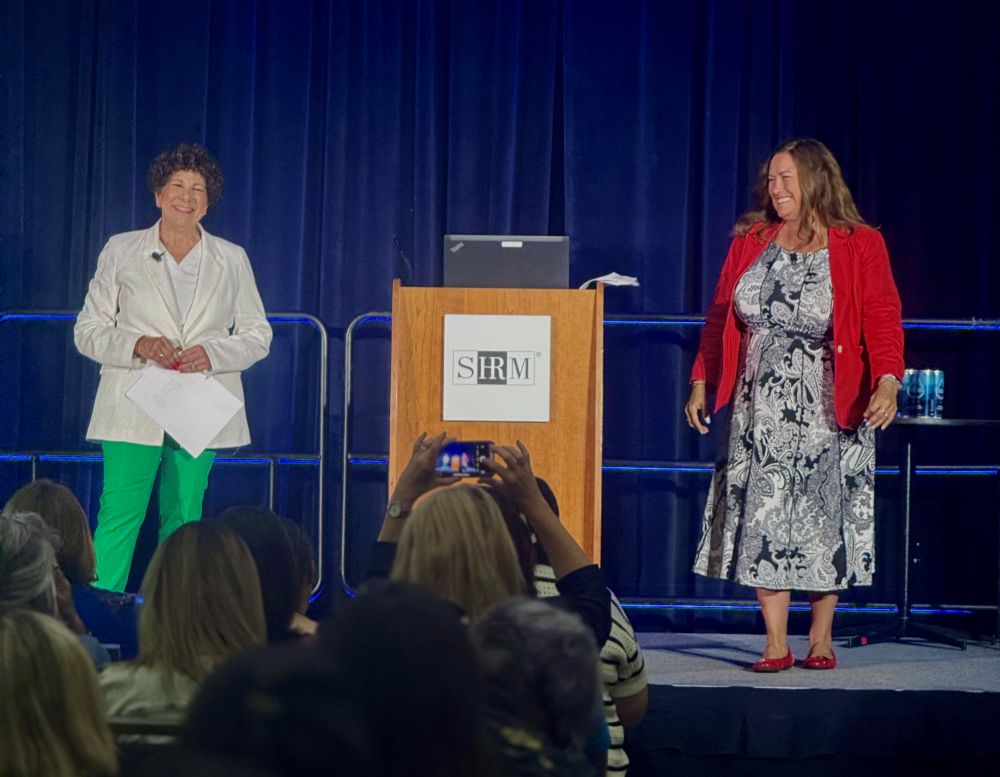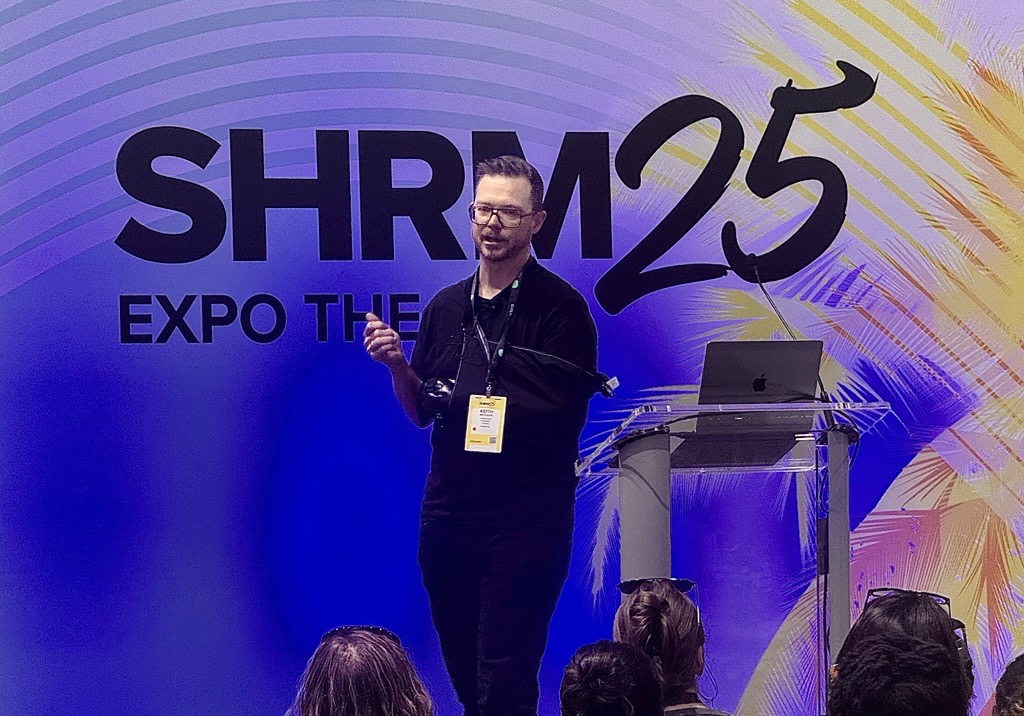Day 2 of SHRM 25 keeps the conversation rolling on HR’s biggest struggles, and the strategies and solutions are only getting more innovative.
The theme for many sessions today seemed to focus around the five generations that currently make up the workforce. From the silent generation to Gen Z, each brings a unique list of strengths and qualifications that, when properly fostered, can future-proof your workforce and create a competitive office.
But doing so requires strategic thinking and intentional planning. So, what’s the data you need to know, and what can you do about it?
What Gen Z Can Be: 4 Skills To Hone
We began the day hearing from H&M’s Head of Learning & Performance, Jeremy Reese, on how versatile Gen Z workers can be, and what HR leaders need in order to maximize their potential.
Reese abated some of the stereotypes of Gen Z workers, describing these young professionals as “Value conscious, hardworking problem-solvers, and devoted to social cause.”
Specifically, Reese notes the generations reported “hyper-cognition”, the ability to process information 3 times faster than previous generations—their use of tech from a young edge has heightening their senses rather than dulling them.
All these values are just waiting to be capitalized on, and those who don’t will fall behind. In just 5 years, Gen Z will overtake Gen X for the second highest percentage of active workers, making up over 30% of the workforce.
Ultimately, Reese outlines 4 skills you can foster in your Gen Z employees to create 4 super workers:
- Digital fluence -> Productive Powerhouses
- Inclusive Values -> Culture Drivers
- Adaptability -> Change Makers
- Hyper Cognition -> Innovation Experts
Like Fine Wine: The Value of Older Candidates
With the focus around Gen Z, we often forget about another generational pool of prospective hires. During a session with Business Psychologist and Strategies Maria Malayter alongside Life and Leadership Coach Barb Mason, they shared an in-depth report and guide on how underutilized older candidates are when hiring.
In a live survey, 47% of the crowd said they were having difficulty finding qualified talent, with another 46% saying they were somewhat having difficulty. The solution? Stop glancing over those applications of 65+ year old workers.
The benefits these older talents bring, Mason and Malayter explain, is not only their decades of lived experience, but also their commitment to success and unique perspective on problem solving.
One of the greatest potential growth opportunities this presents is one the speakers briefly mentioned. Though we sometimes think of our older and younger generations at odds with one another, hiring Baby Boomer employees for some lower management positions allows for fantastic mentorship opportunities.
These older generations have vast amounts of knowledge and experience that can transform their teams and is an asset irreplaceable once lost. While more actively hiring older talent provides a short-term solution to this, it grants the opportunity for them to direct the younger generation and guide them as close mentors and friends to their young teammates rather than a stratified hierarchy.
Every Generation Hates Performance Reviews
Despite the many differences generations may have, one thing remains the same between them all: everyone hates performance reviews.
A tale as old as time, performance reviews have been the bane of both HR professionals and employees work life. They’re tedious, hard to plan, and never seem to yield any meaningful results. Is it time to throw them to the curb, or is there a way to reimagine them, and finally start seeing a positive change?
Keith Metcalfe, President of Acorn evaluated all the pain points associated with performance reviews, and offered both actionable solutions and the resources to recontextualize these dreaded meetings into competency initiatives.
The solutions largely centered around creating a common language. When leaders speak to employees, what they say should be consistent with what the employee understands. The ball drops when progress is locked behind vague buzzwords and suggestions like “learning initiatives” and “circle back to this next time.” To improve, these talks should be actionable, properly recorded for retrospection, and equally understood by both parties.
To account for all of this and more, Acorn built an AI Capability Assistant, which finds and defines the competencies for job roles, allowing managers and employees to more accurately create paths for growth, and have start having reviews that actually matter.







